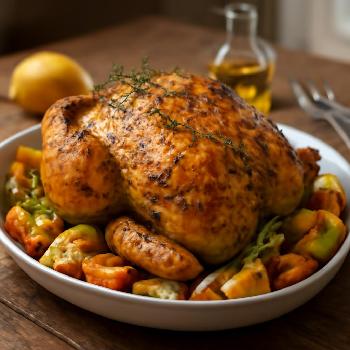Healthy & Special Diets > Low-Sodium Recipes > Low-Sodium Cooking Techniques > Roasting and Grilling for Natural Flavor
Herb and Lemon Roasted Chicken (Low-Sodium)
A flavorful and healthy roasted chicken recipe using fresh herbs, lemon, and low-sodium cooking techniques to enhance natural flavors. This recipe eliminates added salt, relying on the aromatic herbs and citrus to create a delicious and satisfying meal.

Ingredients
- 1 Whole Chicken (about 3-4 lbs)
- 2 sprigs Fresh Rosemary
- 2 sprigs Fresh Thyme
- 1 Lemon
- 4 cloves Garlic
- 1/2 teaspoon Black Pepper
- 2 tablespoons Olive Oil
- 1 Onion
- 2 Carrots
- 2 Celery Stalks
Preparation
Preheat your oven to 400°F (200°C). Rinse the chicken inside and out and pat it dry with paper towels. Drying the chicken helps the skin to crisp up nicely during roasting.
Flavor Infusion
In a small bowl, mix the black pepper with the olive oil. Rub this mixture all over the chicken, ensuring it's evenly coated. This helps the herbs adhere and adds a subtle flavor depth.
Aromatic Stuffing
Stuff the cavity of the chicken with rosemary sprigs, thyme sprigs, garlic cloves (peeled), and the lemon (halved or quartered). These aromatics will infuse the chicken with their flavors from the inside out.
Vegetable Base
Chop the onion, carrots, and celery stalks into large pieces. Spread these vegetables evenly in the bottom of a roasting pan. This creates a natural rack for the chicken and adds flavor to the pan drippings.
Roasting
Place the chicken on top of the vegetables in the roasting pan. Roast in the preheated oven for 1 hour and 15 minutes, or until the internal temperature of the thickest part of the thigh reaches 165°F (74°C). Use a meat thermometer to ensure accurate doneness.
Basting (Optional)
For extra crispy skin, you can baste the chicken with its own juices every 20-30 minutes during roasting. This isn't strictly necessary, but it does enhance the browning and flavor.
Resting
Once the chicken is cooked, remove it from the oven and let it rest for 10-15 minutes before carving. This allows the juices to redistribute, resulting in a more tender and flavorful bird.
Serving
Carve the chicken and serve with the roasted vegetables from the pan. You can also use the pan drippings to make a simple gravy or sauce by skimming off excess fat and simmering the remaining juices with a little cornstarch slurry.
Nutrition Facts Estimated per 100g of product
Calories: 200kcal
Protein: 25g
Fat: 10g
Carbohydrates: 2g
Sodium: 50mg (estimated, depends on natural sodium content of chicken and vegetables)
Other Important Considerations for Nutrition
This recipe is naturally low in sodium due to the absence of added salt. Be sure to use fresh, unprocessed ingredients to further control sodium levels. Consider using low-sodium chicken broth (if making gravy) to keep the sodium content minimal.
FAQ
-
Can I use other herbs?
Yes, feel free to experiment with other herbs like oregano, sage, or marjoram. Adjust the quantities to your preference. -
Can I add other vegetables?
Absolutely! Potatoes, sweet potatoes, and parsnips are excellent additions to the roasting pan. -
How do I ensure the chicken is cooked through?
The best way is to use a meat thermometer. Insert it into the thickest part of the thigh, avoiding the bone. The internal temperature should reach 165°F (74°C).
